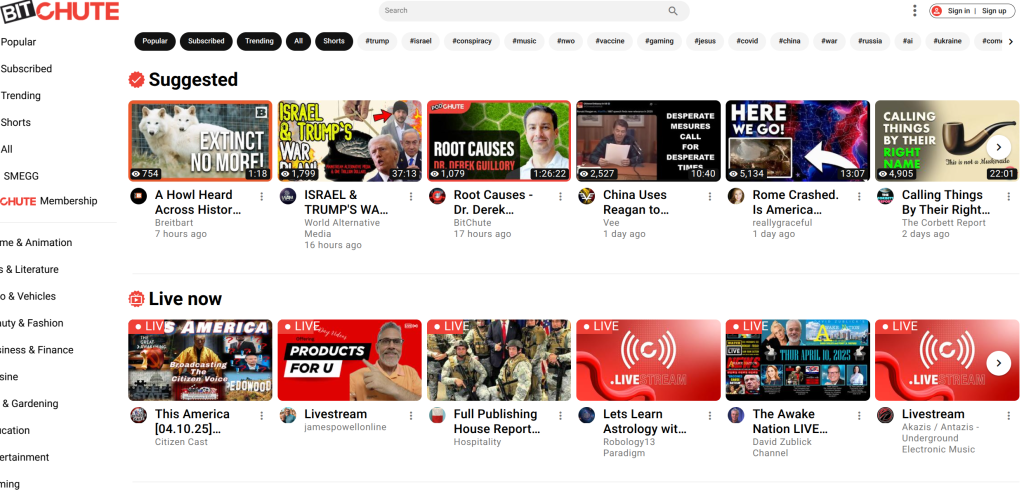A READER alerted us to this statement posted on the Bitchute homepage, visible to geolocated UK users:
‘After careful review and ongoing evaluation of the regulatory landscape in the United Kingdom, we regret to inform you that BitChute will be discontinuing its video sharing service for UK residents.
‘The introduction of the UK Online Safety Act of 2023 has brought about significant changes in the regulatory framework governing online content and community interactions. Notably, the Act contains sweeping provisions and onerous corrective measures with respect to content moderation and enforcement. In particular, the broad enforcement powers granted to the regulator of communication services, Ofcom, have raised concerns regarding the open-ended and unpredictable nature of regulatory compliance for our platform.
‘The BitChute platform has always operated on principles of freedom of speech, expression and association, and strived to foster an open and inclusive environment for content creators and audiences alike. However, the evolving regulatory pressures — including strict enforcement mechanisms and potential liabilities — have created an operational landscape in which continuing to serve the UK market exposes our company to unacceptable legal and compliance risks. Despite our best efforts to navigate these challenges, the uncertainty surrounding the OSA’s enforcement by Ofcom and its far-reaching implications leaves us no viable alternative but to cease normal operations in the UK.
‘Therefore, effective immediately, BitChute platform users in the UK will no longer be available to view content produced by any other BitChute user. Because the OSA’s primary concern is that members of the public will view content deemed unsafe, however, we will permit UK BitChute users to continue to post content. The significant change will be that this UK user-posted content will not be viewable by any other UK user, but will be visible to other users outside of the UK. Users outside the UK may comment on that content, which the creator will continue to be able to read, delete, block, reply and flag. Users outside the UK may share UK-user produced content to other users outside of the UK as normal. In other words, for users in the UK, including content creators, the BitChute platform is no longer a user-to-UK user video sharing service.’
This is the exactly the kind of consequence we at TCW feared a result of the overly restrictive and poorly written Online Safety Act 2023, which has now come into force.
The way the technology works is that websites can use a geolocation service to analyse the IP address your internet service provider has given your service, and use this to determine where you are. Google does this to tailor ads to you, Amazon does this to get you the most convenient version of their website.
Now Bitchute are using this service to protect themselves from the UK Government’s overreach.
The good news: there is a way round this.
You can use a Virtual Private Network, or VPN, to get around content restrictions online. Whether it’s trying to watch shows that aren’t available on UK streaming services, reading international news, or accessing websites that are blocked for one reason or another, a VPN offers a simple way to bypass these barriers.
A VPN works by changing your apparent online location. Instead of your internet connection showing you’re in the UK, it can appear as though you’re browsing from another country. This allows you to access content that would otherwise be off-limits due to regional restrictions.
The VPN provider TCW‘s webmistress uses is Mullvad. Unlike some other services, Mullvad focuses heavily on privacy and ease of use. You don’t need to hand over your email address or any personal details to create an account — you simply get a random number that acts as your login. This keeps your identity completely private from the very start.
Mullvad also doesn’t track what you do online. It keeps no records of your activity and regularly undergoes independent checks to prove this.
In terms of use, Mullvad’s app is clean and simple. You install it, choose a country to connect through, and you’re ready to go. Whether you’re on your laptop, phone, or tablet, it works quietly in the background, mostly without slowing things down.
Other VPN services are available, although it makes sense to use one that is explicitly non-logging – there is no record of your browsing activity kept in any way.
I have tested it, and we are are back in business.

You can buy 12 months of Mullvad’s service for £48 from Amazon, or direct on the Mullvad site, using a credit card, crypto, or even cash.
The simplicity of using a VPN makes a mockery of the Online Safety Act, as it means you can get round any location restriction. The Act simply makes the internet less free, open and easy to use for law-abiding UK citizens, while criminals, abusers and pornographers will have been using VPNs for years to evade scrutiny. The Act is stupid, overreaching, pointless censorship.
Now you can use a VPN to bypass the harms of the Online Safety Act too.
The moderator will try to answer any questions in the comments.











